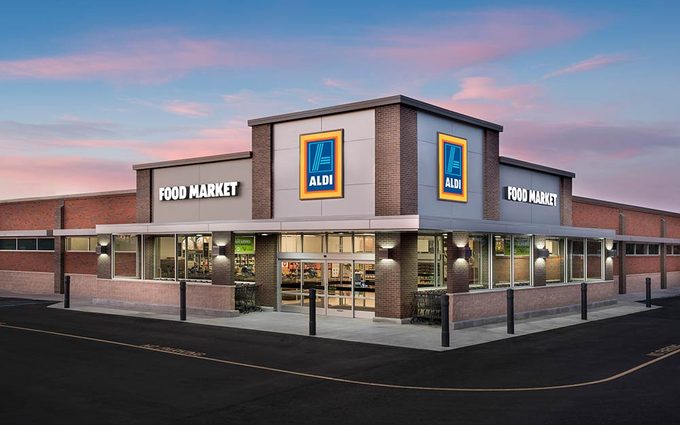This German-based grocer brings a whole lot more than just groceries to the (American) table. Here's why you'll want to start shopping at Aldi.

What the Heck Is Aldi, and Why Is Everyone Talking About It?


Maybe you’ve seen the glowing orange and blue Aldi sign but never stopped in. Or maybe you’ve scrolled past the Aldi-enthusiast TikToks touting the latest deals or the “five must-buy items this week.” Or maybe you don’t live within shopping distance of one of the German-based grocers 1,600 stores across 35 states and wondered, what is Aldi?
What kind of store is Aldi?
Aldi is a discount grocery store founded by two brothers in 1961 in Essen, Germany—and it was recently named the cheapest grocery store in the country. “Everything we do is focused on offering people high-quality and affordable food,” says Liz Ruggles, Aldi spokesperson. “Our customers trust us to consistently and conveniently deliver the highest quality at the lowest prices. The more our customers know us, the more they love us.”
Consumers rave about the chain’s low-cost organic options, award-winning wine that sells for less than the cost of a single pricey cocktail and exclusive name-brand products. More important, though, Aldi’s low prices and attention to quality are a testament to the notion that a thoughtful, balanced diet doesn’t have to come at a high cost. A healthy, happy lifestyle is something all families should have the opportunity to enjoy, regardless of the paycheck(s) they’re working with.
“We’ve always believed in one thing: everyone deserves quality food at quality prices,” Ruggles says.
The Aldi secret: in-house brands
Aldi wants you to not only save money on your grocery bill, but also feel really, truly good about what you’re buying—which is why they’ve taken matters into their own hands to distribute more than 90% of their products via their own in-house lines. These private yet affordable labels allow shoppers to stock their kitchens with healthier, high-quality food items that won’t break the bank.
Less is more
But how exactly does Aldi manage to stay so profitable despite its amazingly cheap prices? Ruggles says it’s through a simple, streamlined approach to selling the very goods its customers are most likely to take home. “We’d rather save people money on the essentials than charge them for the unnecessary,” she explains. “For example, we only carry the most commonly purchased grocery items in the most popular sizes. Instead of half an aisle of ketchup, we sell only a handful of the best.”
And while the uniform layout of most Aldi stores seems simple enough, it’s definitely unlike that of any typical American grocer. If you’re a rookie, that first visit can feel very unfamiliar. “I was pretty overwhelmed at first,” says Bryanna Sandquist, a Minneapolis resident and Aldi’s shopper. “The setup forces you to walk in a straight line, and you can’t go back to where you started.” Now, Sandquist attests to the time-saving benefits of Aldi’s straightforward setup. “It’s actually made the pace of my own grocery shopping a lot faster when I’m shopping by myself. I’m forced to make quicker decisions.”
Aldi’s core values
Aldi currently boasts more than 2,500 stores from coast to coast. Yet in the face of all this growth and change, the grocer’s core business values—consistency, simplicity and responsibility—will continue to mirror those of the families whose dollars keep the chain thriving. “Our values create real value for people. They’re not just words. They’re operating principles that inspire our products and people,” says Ruggles. “We’re growing at a time when other retailers are struggling because we’re giving our customers what they want—the best products at the best value. That’s been our formula for the last 40 years, and we’re sticking to it.”
About the expert
|
Why trust us
At Reader’s Digest, we’re committed to producing high-quality content by writers with expertise and experience in their field in consultation with relevant, qualified experts. We rely on reputable primary sources, including government and professional organizations and academic institutions as well as our writers’ personal experiences where appropriate. We verify all facts and data, back them with credible sourcing and revisit them over time to ensure they remain accurate and up to date. Read more about our team, our contributors and our editorial policies.
Sources:
- Aldi: “Our Purpose and Core Values”




















